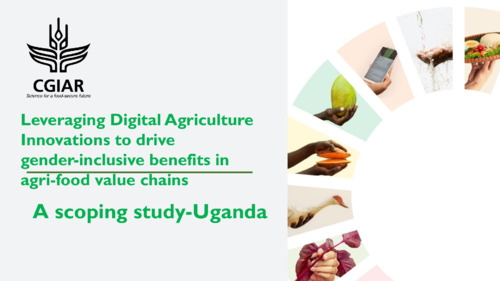Leveraging Digital Agriculture Innovations to drive gender-inclusive benefits in agri-food value chains : A scoping study - Uganda
Effective application of digital agricultural technologies (DAT) has emerged as a catalyst in addressing agrifood sector challenges related to productivity and efficiency. DATs have shown the potential to address bottlenecks in access to extension services, marketing systems, suitable financial products, and logistics, as well as supply chain management. This potential has generated enthusiasm among practitioners and entrepreneurs who strive to foster gender-equitable and inclusive development in value chains. However, there has also been caution against addressing gender disparities to “do no harm” with DAT. Some studies have highlighted how the trajectory of DAT can perpetuate inequalities and power imbalances. The CGIAR Initiative on Rethinking Food Markets conducted a scoping study to assess the influence of the DATs in Uganda’s agri-food sector on gender inequalities and inclusiveness. The study used a qualitative approach to collect data in two phases. The first phase involved conducting an inception workshop followed by key informant interviews with 39 service providers and enablers. The second phase involved case studies using 12 FGDs, 12 individual interviews and a validation workshop. Results showed that the DATs were simply being layered over existing gender inequalities and likely to exacerbate them. Also, the development of most DATs is business minded and does not have any social goals. There is a need for research on how the role of DAT can be modified—how to use, build and fund DATs for better, more equitable outcomes.

